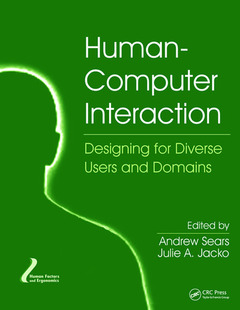Human-Computer Interaction Designing for Diverse Users and Domains Human Factors and Ergonomics Series
Coordonnateurs : Sears Andrew, Jacko Julie A.

Hailed on first publication as a compendium of foundational principles and cutting-edge research, The Human-Computer Interaction Handbook has become the gold standard reference in this field. Derived from select chapters of this groundbreaking resource, Human-Computer Interaction: Designing for Diverse Users and Domains emphasizes design for users as such as children, older adults, and individuals with physical, cognitive, visual, and hearing impairments. It also discusses HCI in the context of specific domains including healthcare, games, and the aerospace industry.
Topics include the role of gender in HCI, information technology and older adults, motor vehicle driver interfaces, and user-centered design in games. While human-computer interaction may have emerged from within computing, significant contributions have come from a variety of fields including industrial engineering, psychology, education, and graphic design. No where is this more apparent then when designing solutions for users as diverse as children, older adults, and individuals with physical, cognitive, visual, or hearing impairments.
Designing for Diversity. The Digital Divide: The Role of Gender in Human Computer Interaction. Information Technology and Older Adults. HCI for Kids. Information Technology for Cognitive Support. Physical Disabilities and Computing Technologies: An Analysis of Impairments. Perceptual Impairments: New Advancements Promoting Technological Access. Universal Accessibility and Functionally Illiterate Populations: Implications for HCI, Design, and Testing. Computing Technologies for Deaf and Hard of Hearing Users. Application/Domain Specific Design. Human-Computer Interaction in Health Care. Why We Play: Affect and the Fun of Games: Designing Emotions for Games, Entertainment Interfaces and Interactive Products. Motor Vehicle Driver Interfaces. Human-Computer Interaction in Aerospace. User-Centered Design in Games.
Date de parution : 05-2017
21x28 cm
Date de parution : 03-2009
21x28 cm
Thèmes de Human-Computer Interaction :
Mots-clés :
Computing Technologies; Multimodal Interfaces; domain specific design; Easy Fun; information technology; Young Men; Hard Fun; human computer interaction; Hearing Users; user centered design; SAE J2364; CDSS; Learning Disabled Population; Diabetic Retinopathy; Fun Emotions; Lower Literacy Population; People Fun; Fun Keys; Computer Anxiety; Interactive Health Communication; CPOE System; Flight Management Systems; Stereotype Threat; Perceptual Interfaces; Working Memory; CPOE; Severe Pi; Visual Impairments; Fitts List



